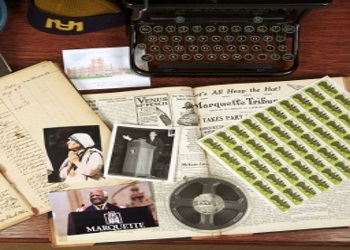CATHOLIC ASSOCIATION FOR INTERNATIONAL PEACE RECORDS Administrative History, Scope and Content
Administrative History
In 1926 representatives of the Social Action Department of the National Catholic Welfare Conference, the National Council of Catholic Men, and the National Council of Catholic Women founded an association of Catholics to further the aim of international peace. According to its constitution, the "ultimate purpose" of the new association (administered as an independent branch of the NCWC's Social Action Department, which served as its secretariat) would be "to promote, in conformity with the mind of the Church, the Peace of Christ in the Kingdom of Christ." The Catholic Association for International Peace sought to meet this goal through the intensive study of current issues, the production of reports and statements on matters of international importance, and the publication of pamphlets by Catholic scholars on these issues.
Extremely active during the turbulent decade before World War II, the CAIP experienced a rebirth following the end of the war and the founding of the United Nations. In 1952 it established a peace award, given out at the annual conference to an outstanding American who helped further Christian principles of justice and charity in international life; recipients included George Meany, Rev. John Courtney Murray, and R. Sargent Shriver. Staunchly anti-communist throughout this period, the Association endorsed the U.S. government's policy of containment toward the Soviet Union.
As the events of the 1960s unfolded, the CAIP retained its anti-communist stance and "just war" orientation (supporting the Vietnam War) while seeking unsuccessfully to increase its membership. When the Catholic bishops reorganized the NCWC as the United States Catholic Conference in 1967, they created a new Commission on World Justice and Peace. Rendered superfluous in the eyes of USCC policy makers, the CAIP went out of existence the following year.
Scope and Content
Series 1, Annual Conferences and Reports, 1931-1967, contains information about the Association's annual meetings, including correspondence, programs, publicity, tape recordings (1962 and 1963), and texts of speeches. Annual reports on the work of the CAIP are also included. The series is arranged by date of meeting or report, and alphabetically thereunder.
Series 2, Governing Bodies, 1927-1968, contains records of the Board of Governors, the Executive Committee/ Executive Council, the Steering Committee, and the Ways and Means Committee, including minutes, reports, and some correspondence. The files are arranged in alphabetical order by governing body.
Series 3, General Correspondence, 1926-1967, is arranged alphabetically. Notable correspondents include John Tracy Ellis, Francis J. Haas, Thomas H. Mahoney, Francis E. McMahon, and Parker T. Moon.
Series 4, Committees, 1928-1967, is arranged alphabetically by name of committee or subcommittee.
Series 5, Subject Files, 1927-1967, contains a wide range of material concerning the Association's membership and relations with other organizations. It is arranged alphabetically by subject.
Series 6, Publications, 1929-1967, undated, contains material published by the CAIP, including newsletters (missing for 1929-1951), press releases, and pamphlets. (A portion of the latter has been digitized by Georgetown University. Click here.) Arrangement is alphabetical by type of publication and chronological thereunder.






